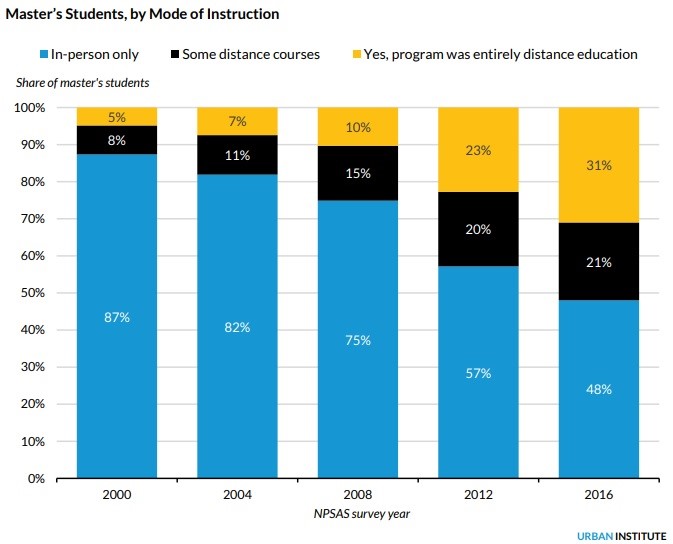 Research studies have shown again and again that online degrees have gradually become more respected by employers. But the truth is that most hiring managers have a mix of positive and negative feelings about them. It helps to understand what kind questions you’re likely to get and which aspects of your degree you may have to defend. Here are five things employers love about online degrees, and five things they may not take seriously about them. Click To List Of Schools Specialized in Online Degrees
Research studies have shown again and again that online degrees have gradually become more respected by employers. But the truth is that most hiring managers have a mix of positive and negative feelings about them. It helps to understand what kind questions you’re likely to get and which aspects of your degree you may have to defend. Here are five things employers love about online degrees, and five things they may not take seriously about them. Click To List Of Schools Specialized in Online Degrees
Why Employers accept online degrees:
- Teamwork: Online degrees often involved a lot of teamwork done through web-based workflow applications. This closely mirrors the way projects are generally done in the business world. Being comfortable with project management and communication with team members in a digital environment is a key skill that can make you stand out, partly because some graduates of traditional classroom-based schools don’t have it.
- Discipline/ Work Ethic: Completing a full degree program online takes a strong work ethic and a focus on achieving a goal. To be able to finish all your classes and projects from home, balancing your schoolwork with life commitments, it’s absolutely necessary to have self-discipline, something that’s highly valued in the corporate world. According to National Center for Education Statistics, only about sixty percent of American college students who start a bachelor’s degree finish it – and that’s within six years, at residential or online schools. If you were able to complete a degree online, it shows you have a good deal of self-discipline.
- Technology Skills: You may not even realize the level of tech skills you’ve acquired during your online degree program. Working with online forums, communicating with professors and submitting coursework online, watching and possibly posting video and generally dealing with tech glitches are all abilities that are expected in almost any business today. Having an online degree should brand you as being tech-savvy.
- Ability To Manage Work vs. Life: Studying online can be tough when there’s no classroom bell to define the hours you will be in class and you’re in your home where friends and family can interrupt you on a regular basis. Your online degree should provide some solid proof that you can manage your work hours versus your life commitments effectively.
- A Job-Focused Degree: Employers see lots of candidates with degrees in English, Sociology and other specialties that are, well, a bit “soft.” If you’re like most online degree holders, you probably studied something that directly relates to a career goal. The odds are that you paid for much of your degree program yourself. That kind of focus can set you apart from many college grads who got a degree because they didn’t really know what else to do after finishing high school.
Why Some Employers Think Online Degrees Look Bad:
- Is an online degree too easy? This is a question an employer may not ask directly, even though he or she may have it in the back of their mind. But you should be well qualified to deal with this issue. After all, you learned in classrooms during high school and may have taken some classroom-based college courses before starting your online program. You can compare your own experiences of online and traditional learning and let the employer know that you feel your online degree program was rigorous and taught you what you need to succeed in the job world.
- University of what? Never heard of that school. Your chances of employment will almost certainly be affected by whether or not a hiring manager has heard of the school you got your degree from. Old line universities usually have the most name recognition. But nowadays, large online schools like Ashford, SNHU and others have become more well known, partly due to their large advertising campaigns. Additionally, there are now online degree programs offered at very well-known old schools lie Georgetown University and Arizona State.
- Shaky accreditation. Accreditation matters with employers – big time. In fact, accreditation may be the #1 key to employer acceptance of your online degree. It’s importance was underlined by a comment from Beth Sears, a staffing professional at Robert Half, one of the biggest and best known recruiting firms in the world, who told Business Finance in 2018 that “In our experience, degrees that are earned online can work in the job seeker’s favor. As long as the programs are accredited, earning a degree online can speak to the work ethic and dedication of the individual.”
- “Life experience” degrees. Many high quality schools today give credit for the knowledge you have gained in another school or in the workplace. But don’t even go near a school that will sell you a degree with no real academic study. It’s probably a diploma mill that’s a complete waste of money.
- For-profit schools. Undoubtedly, some employers still look at for-profit schools as less credible than state or private colleges. But that attitude is far from universal. In fact, many companies now have partnerships with for-profit schools to do training for their own employees. The best way to deal with this issue is to be ready to talk to the employer about the quality of your degree program and discuss, in very specific terms, the skills it taught you.
Jobs Where Online Degrees Are Most Valued
Some career categories seem clearly more friendly to online degree holders. Nursing, for example, is an are where there is a tremendous shortage of qualified bachelor degree holders. As a result, even the more prestigious hospitals seem open to hiring nurses with non-traditional degrees. Technology departments have long been willing to hire candidates who learn coding or some other aspect of IT through a coding academy, online school or even through a few courses that may not add up to a degree. Accountants and other financial professionals are often hired with either an online diploma or specialty certificate. Teaching has also become a popular area for online study. Although teachers need to do actual classroom work in order to be certified to teach in most areas, they’re frequently hired with an online bachelors or masters degreeAre Online Master’s Degrees Worth It?
A recent article in Inside Higher Ed noted that enrollment in online master’s degrees is growing strongly, with over 31% of all post grad program students now taking 100% online degree programs. A chart in the article illustrates the grown in pure online grad degrees: A “Job Outlook” study by the National Association of Colleges and Employers in 2017 showed that many of the key skills employers want to see on a resume could result from either online vs traditional education.
A “Job Outlook” study by the National Association of Colleges and Employers in 2017 showed that many of the key skills employers want to see on a resume could result from either online vs traditional education.- 59.8% of employers wanted applicants with “Technical Skills”
- 67.5% wanted to hire those with “Analytical/Quantitative Skills”
- 82.9% wanted to see “Problem-Solving Skills”
- 80.3% wanted applicants with “Written Communication Skills”
That Tech Advantage In Your Online Degree
Companies are constantly complaining about the lack of job applicants who have strong technology skills. It’s worth keeping in mind that you’re probably ahead of the curve in that department if you went to college over the internet. The connection between online learning a crucial digital skills was highlighted as a Barcelona, Spain conference hosted by Devex in January, 2020, where University of Southern California Professor Dora Vertenten said online degrees are perhaps even better than a regular degree because students get a strong technology experience in addition to learning the subject they are mastering in: “You’re learning the curriculum of the program but also learning how to use the platforms by submitting homework assignments and giving feedback online.” She went on to say online learning is a great teacher of digital teamwork, which is key in almost all businesses today, and that online courses tend to introduce students into a very diverse group of other students, adding:That ability to develop a cultural competency — the sense of working in diverse environments with diverse people — is a really critical benefit that the online program offers that most campus-based undergraduate and graduate educations can’t offer.”The Society for Human Resource Management (SRHM) found in a survey as far back as 2009 that employers were showing that online degree holders were gradually being more respected: – Human Resource executives say they’re warming to online degrees. Over 50% of the 573 HR professionals surveyed told SRHM that they felt courses taken online were about equal in quality to courses in traditional classroom schools. – 76% of those surveyed said “online degrees are viewed more favorably” than they were five years earlier. The sheer numbers of students taking courses or full degree programs online has continued to swell. Numbers from the Center for Education Statistics show that in 2017, the most recent year measured:
- There were a whopping 6,651,536 students enrolled in college distance education courses.
- From this number, more than 2.7 million were taking all of their courses online.
- For-profit schools played a relatively small role in the overall picture. 4.6 million of all online learners were studying at state or other public universities, 1.1 million were at private schools, while less than 800,000 students were studying at for-profit universities.
How To Do A Fast Check On Any School’s Accreditation
Here’s how to quickly check the accreditation status of a school, before you sign up for a program. You can get a quick overview of an American school’s accreditation status by going to the U.S. Department of Education’s “Database for Accredited Postsecondary Institutions & Programs” page. You can search this database by entering the name of a school you’re interested in, by searching for all schools in a state or by finding schools that have been approved by a specific accreditation agency. Be aware that some schools may be accredited for specific programs only. The key accreditation agencies you need to know about are:- The New England Commission of Higher Education
- The Middle States Commission on Higher Education
- The Northwest Commission on Colleges and Universities
- The Southern Association of Colleges and Schools Commission on Colleges
- The Higher Learning Commission
- WASC Senior College and University Commission
- Accrediting Commission for Community and Junior Colleges